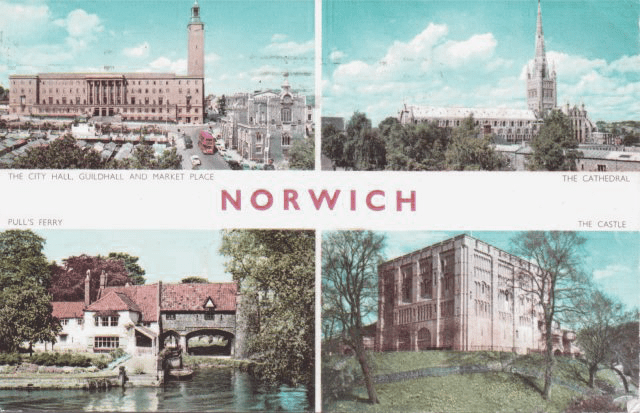My Little Gnudren,
Today Old Gnu wants to introduce you to Mr. James Hook, a composer and organist. He was born in Norwich and wore spectacles.

This was probably because he composed a vast amount of music, and like our great father in God, Johann Sebastian Bach, possibly strained his eyesight by composing well into the night – if folklore about eyesight is to be believed.
Also born in Norwich was this man, John Taylor.

According to Mr. Waki Pedia John Taylor was “an early British Eye Surgeon, self-promoter and medical charlatan.”

Mr. Samuel Johnson said of Mr. Taylor that his life demonstrated “an instance of how far impudence may carry ignorance.” [ed. very poetic, n’est-ce pas?].
Mr. Taylor styled himself as Chevalier John Taylor. He travelled Europe like the travelling entertainers of the time, blinding hundreds of people. With posters distributed in European towns well before beforehand, on his arrival he would “with great pomp and splendour…do his thing with exaggerated drama.” His motto was, Qui dat videre dat viver – He who gives sight, give life.” He practised in the most flamboyant way, drawing crowds to watch procedures in the town square – and then getting out of town after the patients had parted with their money and before they had taken their bandages off. In 1750, after two lots of ‘surgery’ he blinded our great father in God Johann Sebastian Bach, and killed him with the resulting bacterial infection some months later. If we had entered the Eurovision song contest that year, we would definitely have scored nul points, whatever the quality of the song. [I can’t think why we have scored nul points this time… or perhaps I can.]
Eight years later, he blinded our own illustrious very British composer, George Fredrick Handel. Handel died the following year.

Yet the wealthy in Europe sought him out. In 1736, William Hogarth produced a satirical print comprising the notorious medical quacks of his day. The print was titled The Company of Undertakers and it only cost 6 pence.

John Taylor is seen the top left of the engraving. But would they listen?! George II appointed him as his personal eye doctor.
But hey, there is no need to bomb Norwich for producing this perverse son of theirs! Unfortunately I don’t think there are any statues to pull down and throw in the River Wensum. Chevalier Taylor, ironically spent the final years of his life totally blind. Did he operate on himself? Whatever happened, Old Gnu suggests you don’t do eye surgery on yourself. Chevalier Taylor died a long way from Norwich, in Prague actually, in 1772.
But Old Gnu digresses. Mr Hook had a long musical career that embraced both secular and religious music. Hook was a fine teacher and made a considerable sum from teaching. He took posts in the Pleasure Gardens of London and spent nearly 50 years as musician in residence at the Vauxhall Gardens.

He composed 30 works for stage [for Covent Garden, Drury Lane & Vauxhall Gardens], and more than 2000 songs, – he is Britain’s most prolific song writer – and works for orchestra and chamber music. His output was vast. He was expected to play a concerto on the organ each evening at the Vauxhall concert. Concurrently he held posts of organist at various churches and latterly at St Johns Horselydown, Bermondsey. He frequently played concerts on newly built organs, both in London and in nearby counties, often playing his own compositions. He was highly successful as a teacher of organ and harpsichord.
What is more he seems to have a very good relationship with his family. His first wife, Elizabeth Jane Madden was an artist. She not only provided the floral decorations for the pillars in the orchestra at Vauxhall Gardens, she also provided him with the libretto for his opera The Double Disguise [1784]. His son, James, provided the libretto for 2 stage works and his second son, Theodore Edward wrote many of the words for Mr.Hook’s songs between 1805 and 1809 and the librettos for 8 operas. It seems the family was a production line. In 1805 his wife Jane died. In 1806 he married Harriettle Horncastle James. It seems it was a good relationship for Mr. Hook continued to produce the best works of his life.
What of the quality of all this music? Well, a substantial part is merely light music for entertainment. A lot of his songs were sung round the pleasure gardens of London but probably were only meant to ‘last’ the season.
Two works that old Gnu has come across show his capabilities as a composer. One is a Voluntary in C Minor and another in E minor. The Fugues contained in these works are “something else”. The second of these works is dedicated to Mr. Charles Wesley Jr. The first is dedicated to his brother Mr. Samuel Wesley. [See what Mr. Samuel Wesley said of it in the footnote below].These were the two sons of the great Hymn writer Charles Wesley and nephews of John Wesley one of the founders of Methodism.
Samuel had 3 children with his wife Charlotte, and 4 children – technically known in those unenlightened days, as bastards – after an affair with Sarah Suter a teenage domestic servant. One of these was the great Samuel Sebastian Wesley who produced wonderful church music but was a real bastard to work with, in the colloquial sense. Mr. Samuel Wesley’s output as a composer was, despite his behaviour, comprised of mostly works for the church. God moves in a mysterious way.
In comparison, the mild Mr. Hook, whose life and output was contaminated by work for the theatre and the pleasure gardens, was a beacon of virtue worthy of the Weslyan Holiness movement. God truly moves in a mysterious way.
In 1820, at the age of 74, Mr. Hook decided he had had enough. To the horror of his employers, he unexpectedly retired, leaving his position at Vauxhall, after almost a half century of service, and he died seven years later in Boulogne.
What a man! There are some signs of a small revival of his music. Old Gnu is keen to get his hands on his Oratorio, The Ascension.
But for the moment let us be content with linking arms – once covid restrictions are lifted – and singing a hearty verse of Sweet Lass of Richmond Hill, Mr. Hook’s best-known song. [Music and words below, but please read the governments Covid guide lines before you start singing.]

Vetus Pater Gnu – spiritu in montem Richmondiae
Academiae Musicorum et Theologia
Turris LA
XXX Mensis Mai MMXXI
Footnote: What Mr. Samuel Wesley said of Mr. Hook in his “Reminiscences” 1836:
“Jemmy Hook to whom I had the impudence to introduce myself, and to whom I never spake in my life, surprised me not a little by his extreme courtesy, and still more by informing me that he had just published a Voluntary at Bland and Weller’s, inscribed to my own Honor’s Worship & Glory – Of course I was was very reconnossant: he desired me to take any number of copies I might be disposed for….. I assure you that the stuff is none of the worst, & the Fugue much more in the Shape of one than any Thing I have ever heard Crotch do on the organ – Hook’s Preludium at the opening of the Acts was also exceedingly good: in thorough Organ Style, and with knowing modulation – I was never more agreeably surprised altogether…. I will also show you the Voluntary. I should like to have your candid Opinion thereof and thereupon.”

